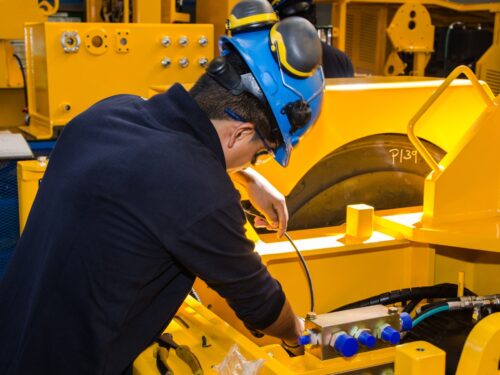
Whether it be industry, commerce or retail, every business in the UK is looking at how to gain the edge over their competitors in a market where trained and motivated personnel are becoming harder and harder to find. Many businesses have recreated apprenticeship schemes, and they are to be applauded. However, if you need trained high-calibre people today who master cutting-edge technology in highly complex, high-pressure environments, then look to an often-overlooked talent pool that can provide this edge – military veterans. In the United Kingdom, there is a growing recognition of the skills, values, and attributes that ex-service personnel bring to the civilian workforce. Veterans have been trained to manage ambiguity and high-pressure situations, work as part of a team, lead with authority, and adapt quickly to ever changing environments. By adding a focus on hiring veterans, UK industries can tap into a rich resource of skilled individuals who possess qualities that are difficult to cultivate outside of military service. With National Remembrance Day on the horizon once again, let’s look at what each of us can do to hire a hero.
Transferable Skills and Expertise
Military veterans are equipped with a diverse skill set that can easily be transferred to civilian industries. Whether it’s leadership, problem-solving, project management, or technical skills, veterans are often trained in roles that mirror those in the business world. For example, a logistics officer in the military is responsible for supply chain management, ensuring timely delivery of goods and resources. These same skills are invaluable in sectors such as retail, manufacturing, or distribution. When I retired from the RAF as an aerospace engineer, my transferable skills were immediately recognised to become the reliability engineer in a major paper manufacturing plant.
One real-world example of a company with a veteran focus is Amazon UK, Military Programs | Amazon.jobs which has actively recruited veterans to fill roles in its logistics and operations teams. An example they quote is of a former Army logistics officer, transitioning into a management role at Amazon. He credits his military experience with giving him the ability to manage teams, plan complex operations, and meet critical deadlines—skills that are directly applicable to his civilian role.
Moreover, many veterans possess specialised technical skills, such as in IT, engineering, and cybersecurity. The UK’s technology sector, which is experiencing rapid growth, can benefit greatly from veterans who have received cutting-edge and often unique training in these areas. The Defence and Security Accelerator (DASA) Defence and Security Accelerator – GOV.UK (www.gov.uk) has demonstrated the power of veteran expertise in cybersecurity, working with veterans to help tackle issues related to national security and cyber threats. Their military training allows them to think critically, operate under pressure, and make informed decisions quickly—qualities that are essential in the tech world.
Leadership and Teamwork
Leadership is a cornerstone of military service. Veterans are used to being thrust into complex leadership roles early in their careers, managing teams, motivating people, and leading by example under challenging circumstances. For example, I went from being an Engineering Squadron Commander to the NATO spokesperson in the Kosovo war in less than a week. These leadership experiences translate well into management and executive positions in the corporate world. Furthermore, military personnel are skilled in teamwork and understand the importance of collaboration, communication, and shared responsibility.
For example, Jaguar Land Rover (JLR), one of the UK’s largest car manufacturers, has launched a programme specifically aimed at hiring veterans with the aim of becoming the ‘employer of choice’ for veterans as they leave the military Armed Forces Engagement | JLR Corporate Website (jaguarlandrover.com). Recognising the leadership qualities veterans bring, JLR recruits ex-service personnel to manage teams and lead projects. Veterans at JLR have thrived, particularly in engineering and production, where leadership, attention to detail, and effective communication are critical. Veterans understand how to achieve objectives through effective team dynamics, contributing significantly to the company’s overall efficiency.
Resilience and Adaptability
One of the most valuable qualities veterans bring to the workforce is resilience. Military service often involves dealing with high-pressure situations, uncertainty, and rapidly changing conditions. Veterans are trained to remain calm under pressure, think clearly, and make critical decisions. This ability to manage stress and adapt to new challenges is crucial in many industries, especially those that require crisis management or rapid problem-solving, such as healthcare, finance, or construction.
In the UK construction sector, Balfour Beatty Armed Forces (balfourbeatty.com) has successfully integrated veterans into their workforce. Veterans have been able to apply their experience in crisis management and adaptability to the often unpredictable world of construction projects. Their ability to manage complex, high-pressure situations makes them valuable employees in roles that require quick thinking and effective decision-making.
Strong Work Ethic and Commitment
Veterans are instilled with an intense sense of duty and commitment, which makes them highly motivated and dedicated employees. They understand the importance of perseverance, discipline, and seeing a task through to completion. These traits are essential in the private sector, where businesses need employees who are not only skilled but also driven to succeed and deliver results.
Take Barclays, 10 years of Barclays Military and Veterans Outreach | Impact | Barclays (home.barclays) for instance, which has a robust program for hiring and supporting veterans. Barclays recognises the value veterans bring in terms of dedication and commitment to their roles. Veterans working at Barclays have excelled in positions ranging from customer service to high-level management, where their military work ethic has shone through. In industries such as finance, where attention to detail, commitment to compliance, and customer satisfaction are paramount, veterans have been able to excel due to their work ethic and dedication to detail.
Diversity and Inclusion
Hiring veterans also promotes diversity and inclusion within the workforce. Veterans come from a wide variety of backgrounds, and their experiences in the military give them unique perspectives that can enrich a company’s culture. Bringing people into the workforce who have lived and worked in diverse environments encourages innovation and fosters an inclusive atmosphere. Veterans are also accustomed to collaborating with people from diverse backgrounds cultures and languages and will help create a more cohesive and collaborative workplace.
FDM Group, Ex Forces Careers & Recruitment | FDM Group UK a UK-based technology services company, actively recruits veterans as part of their commitment to diversity and inclusion. Veterans have brought fresh perspectives to FDM’s work in IT and business consulting, leading to innovative solutions and a more dynamic workplace environment. The company’s veteran employees have proven adept at working in multicultural teams and tackling complex global projects with a fresh outlook.
Loyalty and Retention
Employee retention is a major challenge for many businesses, with high turnover rates leading to increased costs and lost productivity. Veterans tend to be loyal employees, often remaining with companies longer than the average civilian worker. In my own case, I spent 30 years in the RAF and had more than 15 addresses so now look for stability in my civilian life. So veterans are accustomed to long-term commitment and understand the importance of loyalty and stability in their second careers.
Companies such as Capita, Military service leavers | Opportunities for veterans | Capita a UK outsourcing and professional services firm, have noticed higher retention rates among their veteran employees. By providing veterans with meaningful roles that align with their skills, Capita has been able to foster a sense of belonging and commitment, which has translated into lower turnover rates and higher job satisfaction among veterans.
Corporate Social Responsibility (CSR) and Public Image
Finally, employing veterans is not just good for business; it’s also good for a company’s reputation. Many businesses are now prioritizing corporate social responsibility (CSR) and Industry 5.0, and hiring veterans can form a key part of this strategy. By supporting ex-military personnel, companies can enhance their public image and demonstrate a commitment to ethical values such as in giving back to society. This not only appeals to customers and stakeholders but also boosts employee morale, as workers appreciate being part of a socially responsible organisation.
The National Grid, Military service leavers | Opportunities for veterans | Capita one of the UK’s largest utilities companies, has taken a lead in this area, setting up programmes specifically to help veterans transition into civilian roles. By showcasing their efforts in supporting ex-service personnel, National Grid has strengthened its reputation as a socially responsible company while benefiting from the expertise veterans bring to their workforce.
Conclusion
The benefits of employing military veterans in the UK are clear. Veterans bring transferable skills, strong leadership, resilience, adaptability, a strong work ethic, and a commitment to diversity and inclusion. Their loyalty and dedication can also help reduce employee turnover and enhance a company’s public image through corporate social responsibility initiatives. As more UK industries recognise the value veterans provide, they will be able to tap into a rich and underutilised talent pool, ensuring their long-term success while supporting those who have served the country.
By focusing on employing more veterans, UK businesses can benefit from a workforce that is trained, disciplined, and ready to take on the challenges of today’s dynamic industries. If you are looking for a readily available pool of trained and motivated people, hire a veteran.



